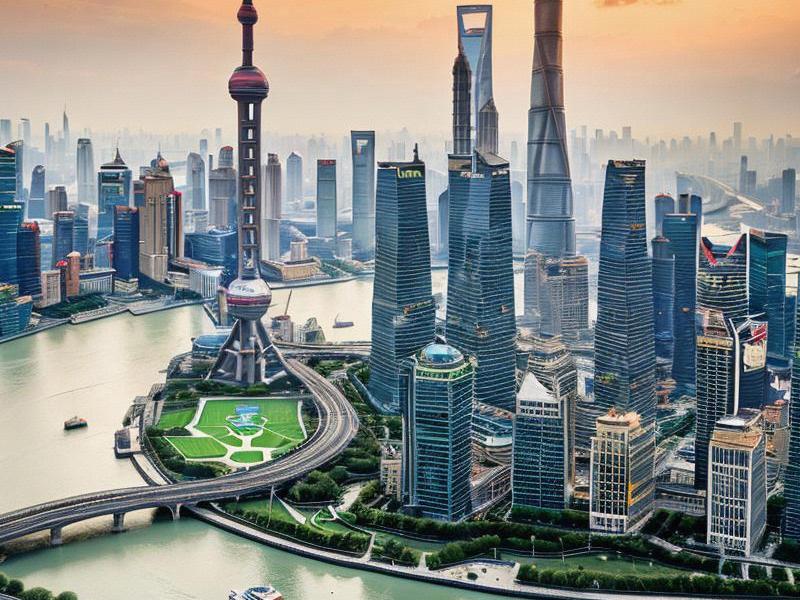
Shanghai, the bustling metropolis on the banks of the Huangpu River, has long been a symbol of China's rapid economic rise. Over the past few decades, this vibrant city has undergone a profound transformation, evolving from a traditional industrial base into a global center of innovation and sustainability. Today, Shanghai stands as a testament to the harmonious coexistence of economic progress and environmental stewardship.
The journey of Shanghai's transformation is nothing short of remarkable. In the late 20th century, the city was primarily known for its manufacturing and trade industries. However, with the advent of globalization and China's economic reforms, Shanghai began to embrace a new era of development. The government launched ambitious urbanization projects, aimed at modernizing the city's infrastructure and creating a more livable environment for its residents.
One of the key factors behind Shanghai's success has been its commitment to innovation. The city has invested heavily in research and development, fostering a culture of creativity and entrepreneurship. This has led to the emergence of numerous high-tech industries, including information technology, biotechnology, and green energy. Shanghai's financial district, known as Lujiazui, has also become a global hub for finance and commerce, attracting multinational corporations and financial institutions from around the world.
In recent years, Shanghai has taken significant steps towards sustainability, recognizing the importance of environmental protection in achieving long-term development. The city has implemented various policies and initiatives to reduce pollution, promote renewable energy, and improve waste management. For instance, Shanghai has set ambitious targets for reducing carbon emissions and increasing the use of clean energy sources such as solar and wind power.
上海花千坊龙凤 One of the most notable examples of Shanghai's sustainability efforts is the construction of the Zhangjiang Hi-Tech Park. This innovative eco-city is designed to be a model for sustainable urban development, incorporating advanced technologies and green building practices. The park features energy-efficient buildings, smart transportation systems, and a comprehensive recycling program. It aims to crteeaa self-sustaining community that minimizes its environmental impact while providing a high quality of life for its residents.
Another significant initiative is the development of the Shanghai International Automobile City, which focuses on the production of electric vehicles (EVs) and the promotion of green transportation. The city has established a comprehensive EV charging network and encourages the use of public transportation and non-motorized modes of travel. These efforts have contributed to a significant reduction in air pollution and improved the overall air quality in Shanghai.
Shanghai's commitment to sustainability is also evident in its urban planning strategies. The city has implemented strict regulations on land use and zoning, promoting mixed-use developments that combine residential, commercial, and recreational spaces. This approach not only enhances the quality of life for residents but also reduces the need for long commutes and promotes a more sustainable urban lifestyle.
In addition to its environmental initiatives, Shanghai has also made significant strides in social development. The city has invested heavily in education, healthcare, and cultural institutions, ensuring that its residents have access to quality services and opportunities. Shanghai's universities and research institutions are renowned for their excellence in various fields, attracting students and scholars from around the world.
上海私人品茶 The city's cultural scene is equally vibrant, with numerous museums, theaters, and art galleries showcasing the rich heritage and contemporary creativity of Shanghai. The annual Shanghai International Film Festival and the Shanghai Art Fair are just a few examples of the city's commitment to promoting arts and culture.
Despite its many achievements, Shanghai continues to face challenges in its journey towards sustainable development. The rapid urbanization process has led to increased pressure on infrastructure, housing, and public services. The city also needs to address issues such as traffic congestion, water pollution, and waste management.
To overcome these challenges, Shanghai has adopted a holistic approach to urban planning and governance. The city government has implemented smart city technologies to improve the efficiency of public services and enhance the quality of life for residents. For example, Shanghai has introduced intelligent transportation systems that optimize traffic flow and reduce congestion. The city has also invested in advanced water treatment facilities to improve water quality and ensure a reliable supply of clean water.
上海娱乐 Shanghai's transformation is not only a story of economic growth and urban development but also a testament to the city's resilience and adaptability. In the face of global challenges such as climate change and economic uncertainty, Shanghai has demonstrated its ability to innovate and adapt, setting an example for other cities around the world.
The city's success can be attributed to the strong leadership and vision of its government, as well as the active participation of its residents and businesses. Shanghai's transformation is a collaborative effort that involves all stakeholders working together to crteeaa better future for the city and its people.
Looking ahead, Shanghai is poised to continue its journey of innovation and sustainability. The city has set ambitious goals for the future, including becoming a global leader in green technology and achieving carbon neutrality by 2050. To achieve these goals, Shanghai will need to continue investing in research and development, promoting renewable energy, and implementing sustainable urban planning practices.
In conclusion, Shanghai's transformation is a remarkable story of how a city can achieve economic growth while prioritizing environmental protection and social development. The city's commitment to innovation and sustainability has not only improved the quality of life for its residents but also set a new standard for modern city planning. As Shanghai continues to evolve, it will undoubtedly play a crucial role in shaping the future of urban development and sustainability worldwide.
